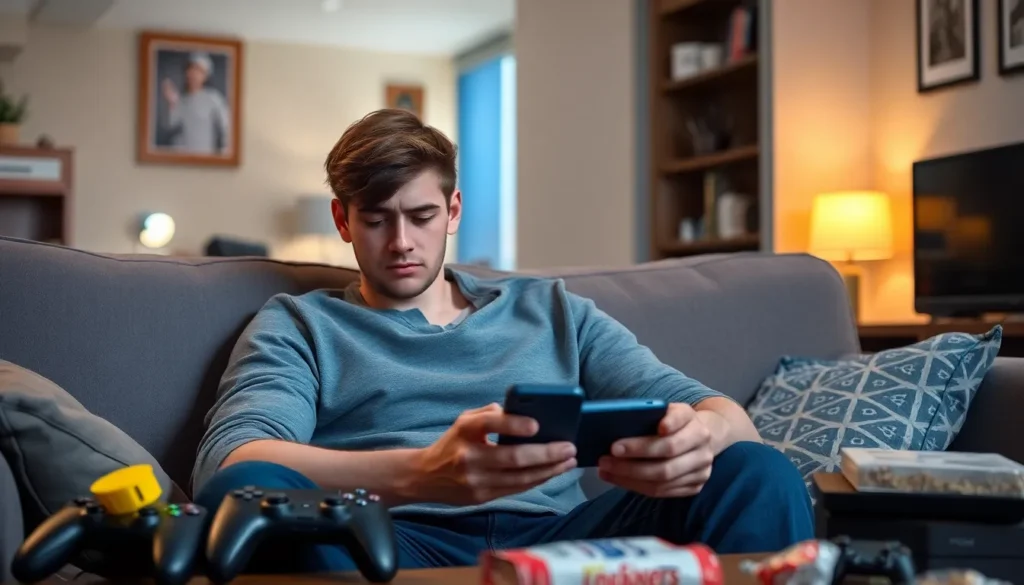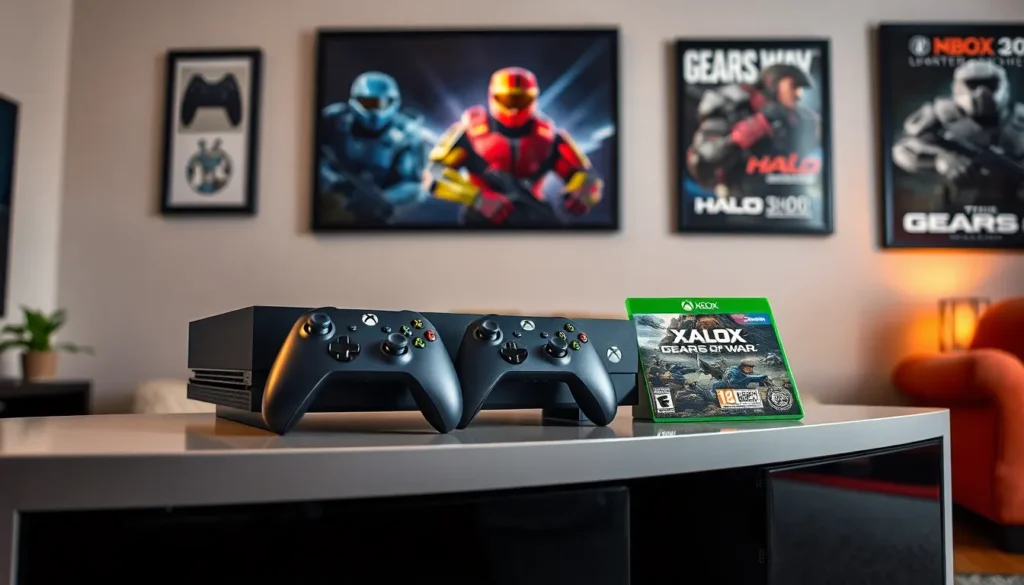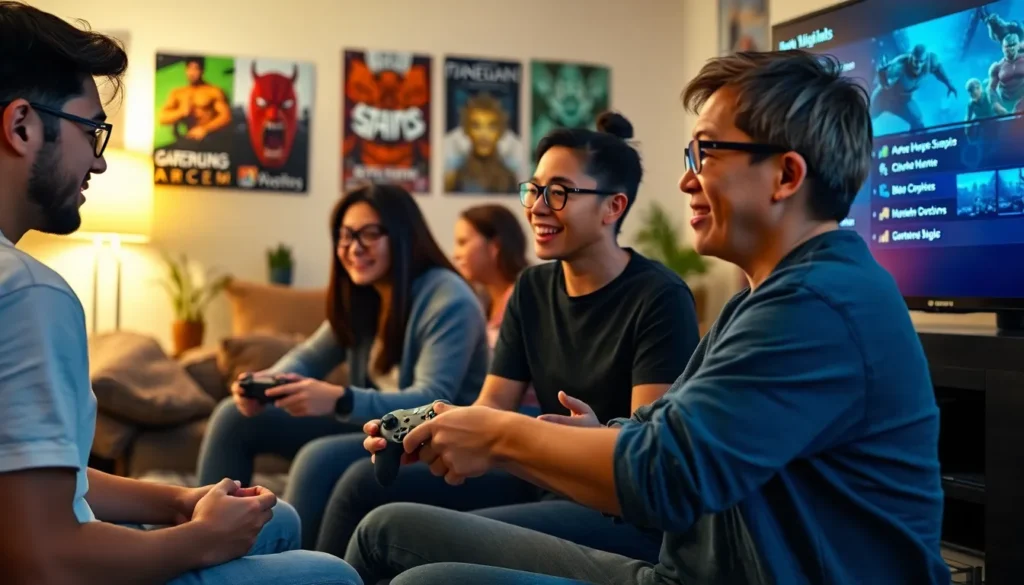Table of Contents
ToggleMobile gaming has taken the world by storm, transforming everyday commutes into epic quests and coffee breaks into intense battles. But as the excitement of leveling up begins to wane, players find themselves facing an unexpected foe: mobile gaming fatigue. Yes, that’s right! Just when you thought you could conquer every pixelated challenge, your thumbs are waving the white flag.
Understanding Mobile Gaming Fatigue
Mobile gaming fatigue describes the decline in interest and enthusiasm for mobile games after extended play. Players may experience this phenomenon when the initial excitement fades, leading to restlessness or a need for a break from gaming.
Definition of Mobile Gaming Fatigue
Mobile gaming fatigue refers to a player’s diminishing engagement with games due to ongoing exposure. Continuous challenges can transform enjoyable experiences into repetitive tasks. Players often feel overwhelmed, leading to a desire to step back and reassess their gaming habits. This fatigue can manifest in reduced playtime or complete disengagement from mobile gaming.
Causes of Mobile Gaming Fatigue
Mobile gaming fatigue emerges from several factors, including repetitive gameplay. Constantly facing similar challenges can lead to boredom. Game developers often prioritize new content, but insufficient updates can contribute to player disinterest. Environmental influences, such as notifications and social pressures, may also overwhelm players, further diminishing their enthusiasm. Recognizing these causes helps developers and players create a healthier gaming environment.
Signs of Mobile Gaming Fatigue

Mobile gaming fatigue can present in various ways, reflecting physical and emotional shifts in the player’s experience. Recognizing these signs helps address fatigue before it results in disengagement.
Physical Symptoms
Physical symptoms manifest as discomfort during gameplay. Frequent eye strain may occur after prolonged screen exposure. Players might experience headaches or fatigue due to extended periods of focused gaming. Poor posture can lead to back and neck pain while gaming. Changes in sleep patterns also indicate mobile gaming fatigue; difficulty falling asleep after gaming sessions is common. Reduced physical activity often accompanies excessive gaming, contributing to overall lethargy.
Emotional Symptoms
Emotional symptoms often surface as irritability or frustration. Players may feel detached from the gaming experience, leading to diminished enjoyment of their favorite titles. A loss of motivation or interest in previously engaging games is frequent. Feelings of anxiety can arise, especially when competing against others or feeling pressured to keep up with in-game updates. Social interactions may decline as players prefer gaming over spending time with friends. Recognizing these emotional cues can help individuals reclaim their enthusiasm for mobile gaming.
Impact of Mobile Gaming Fatigue
Mobile gaming fatigue significantly affects both players and the gaming industry. Understanding these impacts is vital for improving experiences and driving future innovations.
On Players’ Mental Health
Mobile gaming fatigue leads to negative mental health effects. Increased irritability often results from extended gameplay without breaks. Players frequently experience anxiety related to in-game performance and social comparisons. Symptoms like frustration and decreased motivation for games may arise. The pressure to remain competitive can heighten these feelings. Moreover, players may withdraw from social interactions due to decreased enthusiasm. Addressing these mental health concerns fosters a healthier gaming environment that promotes enjoyment.
On Game Developers and the Industry
Game developers face challenges due to mobile gaming fatigue. Extended engagement often drops as players lose interest, affecting revenue streams. Developers must innovate to retain players, creating fresh content and updates that spark renewed interest. Without adequate updates, player retention rates can decline. Industry trends show a correlation between player engagement and developers’ responsiveness to feedback. Additionally, sustainable gaming practices can help build long-term loyalty, contributing positively to the overall gaming ecosystem. Emphasizing player satisfaction remains crucial for ongoing success in the mobile gaming market.
Strategies to Combat Mobile Gaming Fatigue
To address mobile gaming fatigue, players can implement effective strategies that rejuvenate their interest. Adopting specific techniques aids in restoring enthusiasm.
Setting Limits on Playtime
Establishing boundaries on daily gameplay fosters a healthier relationship with mobile games. Players might set specific time limits, like dedicating 30 minutes to an hour daily, which encourages moderation. Scheduling breaks during gameplay also helps maintain focus and prevents mental burnout. Tracking playing time through apps or in-game features provides accountability. Involving friends or family for support can enhance adherence to these limits. Reinforcing moderation often results in a more balanced lifestyle, allowing players to enjoy other activities.
Exploring New Game Genres
Diving into different game genres can reignite excitement and reduce fatigue. Players can experiment with diverse genres, such as puzzle, strategy, and RPGs, broadening their gaming experiences. Discovering indie games may reveal hidden gems with unique mechanics and narratives. Engaging with game reviews or communities allows players to find recommendations tailored to their interests. Broadening horizons often stimulates fresh enthusiasm and prevents stagnation. Embracing variety enhances overall engagement with gaming, making it a more enjoyable pastime.
Mobile gaming fatigue is a real challenge that many players face in today’s fast-paced gaming landscape. Recognizing the signs of fatigue is crucial for both players and developers to ensure a healthier gaming experience. By implementing strategies like setting playtime limits and exploring new genres, players can reignite their passion for gaming. Developers also play a vital role in this dynamic, as providing fresh content and innovative gameplay can keep players engaged and excited. Ultimately, a balanced approach to mobile gaming can help maintain enthusiasm and promote mental well-being in the gaming community.




